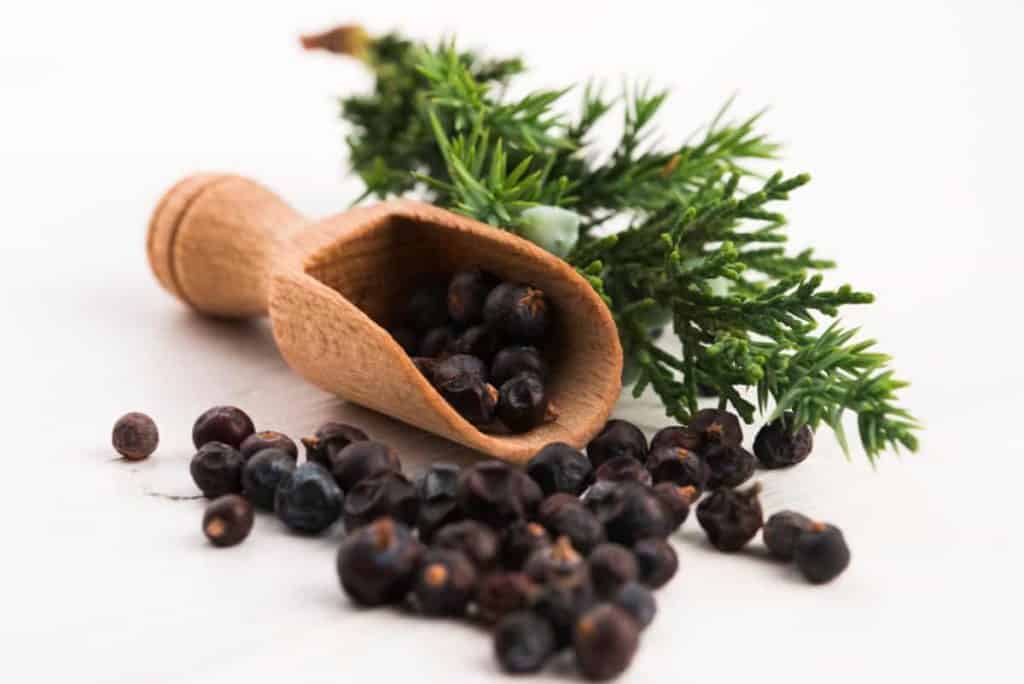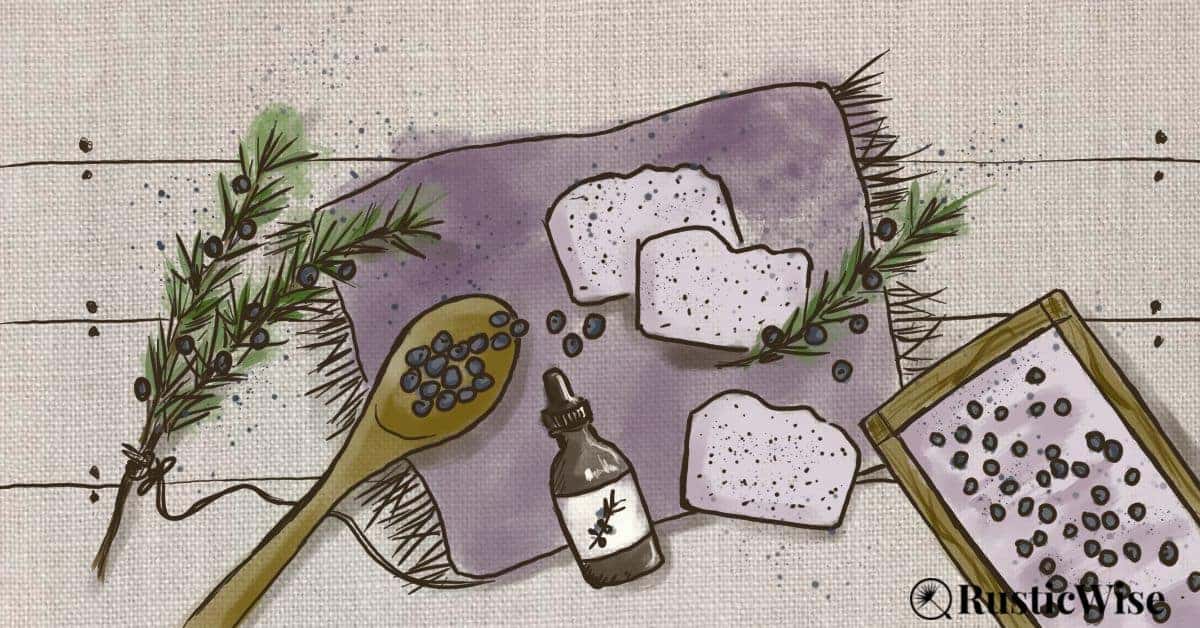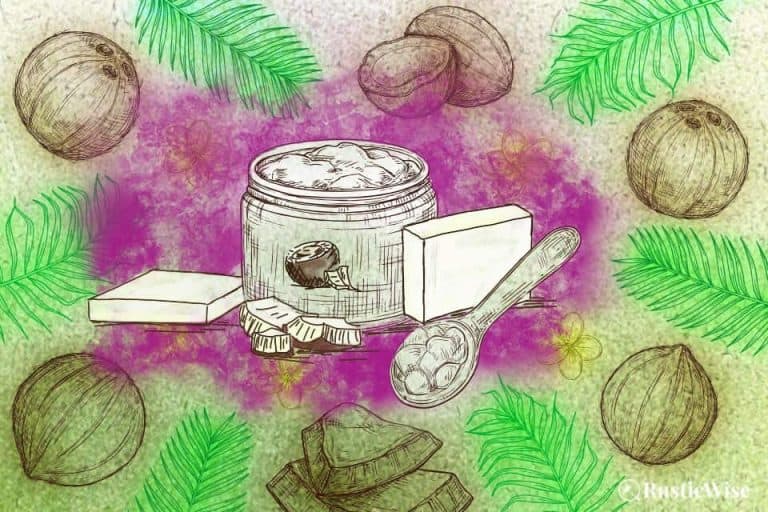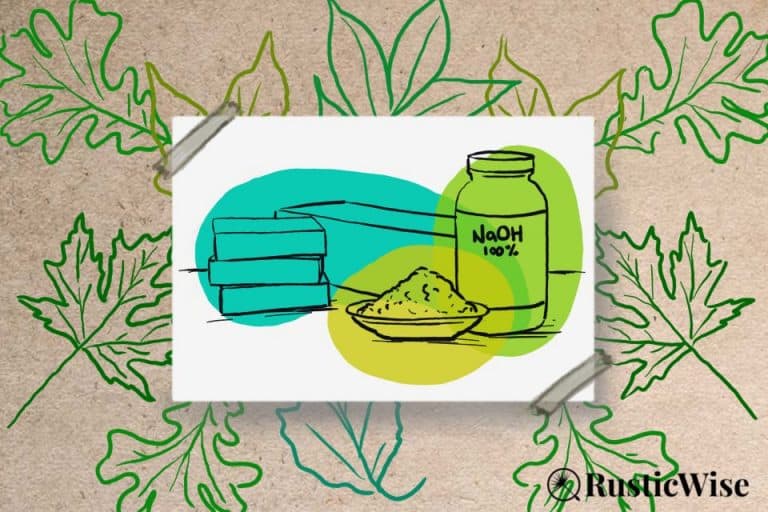How To Use Juniper Berries in Soap Making + Why You Should
RusticWise is supported by its readers. When you purchase through links on our site, we may earn an affiliate commission. As an Amazon Associate, we earn from qualifying purchases. Thank You!
If you’re looking to add natural botanicals to your homemade soap (but don’t want anything too flowery), consider using juniper berries. While called berries, these tiny fruits are actually the tiny cones of the juniper plant. Juniper berries in soap making have antibacterial, antimicrobial, anti-inflammatory, and antioxidant properties. Juniper smells similar to pine, with a fresh and invigorating aroma with a hint of spice.
While lavender and calendula often steal the spotlight in the world of soap making, juniper berries offer unique soothing properties and a refreshing scent that’s perfect for anyone looking for a more neutral (less flowery) scent. Perhaps it’s no surprise that juniper is a scent many men don’t mind (think woodsman or lumberjack!).
You can use juniper whole, dried and ground, or added as an essential oil. Let’s take a closer look at how you can incorporate juniper berries into your next batch of homemade soap.
A quick look at the juniper plant and berries
While there are many varieties of juniper, the most widely spread is common juniper (Juniperus communis) which grows in most parts of the Northern Hemisphere. Juniper is a type of coniferous shrub or tree which belongs to the cypress family¹.
Characterized by its woodsy aroma, the juniper plant has many practical applications. It’s often used as a predominant flavoring for gin (and sometimes beer). If you’re wondering what juniper tastes like, conjure up the flavor of your favorite gin—juniper lends its distinct peppery taste with hints of pine and light fruits.
Young juniper berries are green, and later mature to a dark blue-purple color. Juniper berries are used for culinary purposes: the dried berries are often crushed to flavor stews, soups, and other savory dishes.
Traditionally, various parts of the juniper plant were used for medicinal and therapeutic purposes. Native American people brewed a herbal tea from juniper berries and root bark; this was used to manage diabetes and also to suppress appetite². Traditional Turkish remedies called for the use of juniper berries for treating gastrointestinal woes; they also used it as an antiseptic and as a diuretic³.
And of course, juniper berries and the essential oils derived from it are used in soap and cosmetics both for its invigorating, yet calming scent and therapeutic properties.

Credit: Yay Images
Are juniper berries good for your skin?
When used in skincare and soap, juniper berries provide many benefits. According to an article published in PubMed³, “The essential oil and extracts of juniper have been experimentally documented to have antioxidant, antibacterial, antiviral and antifungal activities.”
What does this mean for you and your skin? Here are a few ways juniper berries help your skin.
Note: Cade oil is an extract derived from the wood of the juniper plant. This differs from juniper berry extract derived from berries of the same plant⁴.
Cautions when using juniper on skin
Juniper oil, juniper extract, or juniper berries should be safe for most healthy skin types. Don’t apply juniper to broken or irritated skin. Sometimes, people may develop redness or irritation. It’s best to try a small amount on skin in an inconspicuous area first.
As a precaution, juniper oil is not recommended for pregnant women, diabetes, or those with kidney or blood pressure problems⁴.
Keep in mind that when using juniper to make handmade soap, the amount added is much less than other key ingredients such as oils and butters.
Where to buy juniper berries
You can find juniper berry essential oil in most health and vitamin shops and online.
When buying juniper berries, most come whole and dried. You can find them in some health food stores, or online. Some larger grocery stores may carry juniper berries in the spice aisle as they are often used as a spice.
It’s best to stick with organic berries when making soap to avoid irritating the skin.
You might like
Organic Juniper Berries Whole, 1 Pound
- Latin/Botanical Name: Juniperus communis
- Origin: Bulgaria
- USDA Certified Organic
Found on Amazon
Check Current Price
Those in Canada and the UK should be taken to the product listing in your region.
How to use juniper berries in soap making
Whether you’re making cold process or melt and pour soap, there are a few ways you can incorporate juniper berries into your recipe.
Whole
Whole juniper berries add a nice decorative touch to homemade soap. Sprinkle on a few berries once the soap batter has been poured into the molds.
Ground
You can buy dried whole juniper berries and grind them with a coffee grinder, spice grinder, or with a mortar and pestle. Depending on your preference, you can grind to a coarse powder or leave larger chunks.
You can add ground juniper berries to lye water for a gentle infusion. The juniper imparts a dark color, and hint of aroma, and becomes softer to boot.
Or, you can add a couple of tablespoons to your soap batter just before pouring into molds. When added to soap this way, juniper acts as a natural, gentle exfoliant when using dried, ground berries.
Juniper berry essential oil
To add an extra dose of piney aroma, you can add a few drops of juniper berry essential oil to your batch of soap. Juniper oil has a clear, pale yellow color. The scent of juniper berries has uplifting and refreshing properties—perfect for those craving an earthy, woodsy bar of soap.
You might like
Juniper Berry Essential Oil 100% Pure, Undiluted, Therapeutic Grade 10 mL (1/3 oz)
- This therapeutic-grade essential oil has a sharp green, woody conifer scent.
- Apply topically when properly diluted, to help reduce the appearance of cellulite, acne and other skin flair ups.
- Massage into skin to ease muscle and joint pain.
Found on Amazon
Check Current Price
Those in Canada and the UK should be taken to the product listing in your region.
Juniper berry pairings in soap
Mixing and matching various botanicals and scents is a great way to customize your batch of soap. Juniper is a fairly versatile scent that pairs well with other earthy, or fresh essential oils.
- Juniper + mint (or spearmint): A super-fresh combo that awakens the senses.
- Juniper + bergamot: The freshness of juniper along with the tart and slightly spicy and floral notes, makes a winning combination.
- Juniper + rosemary: These two have similar piney and woody scents that combine seamlessly.
- Juniper + citrus (try lemon, lime, or orange): The slightly sweet and tangy aromas of citrus pair nicely with juniper.
- Juniper + lavender: The soothing floral notes of lavender also have herbaceous undertones that go well with juniper.
- Juniper + chamomile: With a subtle apple-like scent, chamomile’s herbaceous notes are great with juniper.
- Juniper + sandalwood: Sandalwood’s rich and earthy scent is the perfect match for the refreshing notes of juniper.
Get creative and make your own unique blend for homemade soap!
The takeaway
If you’re looking to spruce up your next batch of homemade soap, look no further than juniper berries. With its refreshing pine-like aroma and skin cleansing and soothing properties, juniper berries in soap making help elevate your bar of soap. Stick with organic berries and use them whole, or crushed. Add some extra oomph with juniper berry essential oil.
Related questions
Are juniper berries safe to eat?
Juniper berries are edible and are commonly dried to flavor meat or savory dishes, as well as alcoholic drinks like gin and beer.
If you come across a juniper plant in the wild and want to sample the berries, it’s best to make sure you’ve properly identified the plant first. While there are roughly 60 varieties of junipers, there are a few with poisonous and bitter-tasting fruits.
The common juniper (Juniperus communis) is the variety used to flavor gin.
People who should avoid ingesting juniper include pregnant women, those with kidney issues, diabetes, and blood pressure problems⁴.
New to making soap? 🧼❓
👉We have a fantastic overview on the whole soapmaking process here: read our Timeless Guide To Soapmaking.
If you would like to see our soapmaking posts organized by topic type, see our Soapmaking Collection.
Would you like more timeless tips via email?
Fun tips to help you live an independent, self-sustaining lifestyle. Opt-out at any time.


References
- Britannica, Juniper plant, https://www.britannica.com/plant/juniper. Accessed October 2021.
- Salem University, Medicinal Properties found in Juniperus communis, https://www.salemstate.edu/. Accessed October 2021. https://digitalcommons.salemstate.edu/cgi/viewcontent.cgi?article=1202&context=researchday
- Raina, R., Verma, P. K., Peshin, R., & Kour, H. (2019). Potential of Juniperus communis L as a nutraceutical in human and veterinary medicine. Heliyon, 5(8), e02376. https://doi.org/10.1016/j.heliyon.2019.e02376
- WebMD, Juniper, https://www.webmd.com/vitamins/ai/ingredientmono-724/juniper. Accessed October 2021.

Author: Theresa Tesolin
Theresa is co-founder of RusticWise. She helps people unleash their inner DIY spirit by encouraging them to get dirty and make or grow something from scratch.











